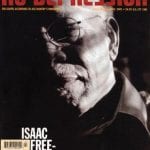Stephen Bruton – All work and all play
A good case could be made for Stephen Bruton as the reigning “hardest-working man in showbiz.” Though Spirit World, released February 26 by New West Records, is just his fourth album since 1993, his overflowing workload with other artists borders on the unbelievable.
Variously listed on album jackets as Stephen, Turner Stephen, T. Stephen, and T.S. Bruton, the native Texan dynamo has appeared on more than 85 recordings as guitarist, vocalist or producer. And when he’s not in the studio, he’s often on the road playing guitar with some of the most accomplished singer-songwriters in the business (over the years, he’s toured with Bob Dylan, Bonnie Raitt and Kris Kristofferson, to name but a few).
Plenty of pickers get lucky and land a plum gig now and then, but one must deliver the goods to get the kind of call-backs that routinely have filled Bruton’s dance card for three decades. Not surprisingly, one of Bruton’s favorite quotes is Mark Twain’s bemused observation: “The harder I work, the luckier I get.”
Bruton’s father, Sumter Bruton Jr., was a respected jazz drummer who also ran a jazz, blues and country music shop in Fort Worth called Record Town, a still-thriving enterprise that has remained in the Bruton family since 1957. Steeped in the heady mix of eclectic tunes and wisdom culled from working musicians who frequented the shop, Bruton and his boyhood pal T Bone Burnett were given a solid platform from which to launch their wide-ranging careers.
Upon graduation from Texas Christian University in 1970, Bruton left Fort Worth with his guitar and $100. After a relatively brief, roundabout trek through Woodstock and Greenwich Village, he crossed paths with Kris Kristofferson. The two hit it off, and when Billy Swan left Kristofferson’s band in 1972, Bruton began a long (if often interrupted) tenure as Kristofferson’s lead guitarist.
Ever since then, Bruton has had all the work he could handle. Connections just kept on happening. Early on, he hooked up with Fort Worth homeboys such as Burnett, Delbert McClinton and Ray Wylie Hubbard. During his time with Kristofferson, he forged links with Dylan, Carly Simon, Donnie Fritts, Billy Swan, Rita Coolidge and Barbra Streisand. When he moved to Austin from Los Angeles a decade ago, Willie Nelson, Jimmie Dale Gilmore, Alejandro Escovedo, Vince Bell and others were added to the fold. For the past five years, he’s spent his Sundays in Austin with the Resentments, an all-acoustic outlet that has included Jon Dee Graham, Jud Newcomb, Bob Schneider and Bruce Hughes.
A complete resume of Bruton’s work would just about fill the rest of this article, but some of the highlights include recording and touring with Bonnie Raitt during her early-’90s salad days, Kristofferson (on more than a dozen albums), Geoff Muldaur (four albums), and McClinton (three albums). His production credits include three records for Escovedo, as well as discs by Gilmore, Hal Ketchum, Chris Smither and Storyville. As a songwriter, he’s been covered by Nelson, Patty Loveless and Marcia Ball, among others.
Add sessions with the likes of Lowell George, Billy Joe Shaver, John Prine, Bruce Cockburn, Steve Goodman, Peter Case, Gene Clark and B.W. Stevenson, and you get a broad, clear picture of a guy who’s a proven facilitator — a player who makes music work.
“The whole thing about guitar playing,” Bruton says, “is you gotta serve the song. You gotta help move the song forward, and what that usually means is, you gotta play without ego. And there’s damn few people who do that. Ego just suddenly takes over, and then it’s, ‘Oh, yeah, well listen to what I can do…’
“And no one’s immune to it,” he continues, “but the stuff that happens when you’re really un-conscious — when you get to a meshed-in level where you’re just playing the song — it suddenly becomes very simple and effortless, and you’re not doing a million notes. You’ve slipped into that realm. And, all of a sudden, you know that that’s where the song lives.
“That’s something I learned when I was working with Kristofferson. You can sit there and do all those licks, but if it doesn’t serve the song, you’re really just wasting precious minutes of your life.”
Having participated in so many memorable albums, Bruton is careful to apply the lessons he learned along the way to his own recordings — when he can carve out some time to make them. To that end, despite his own accomplishments as a producer, he has pointedly put his own records in the hands of trusted amigos.




